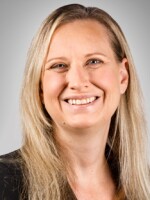BETHLEHEM, Pa. - The home away from home for Lehigh University’s Jewish student population was officially dedicated in October despite being open on a limited basis since 2021.
The COVID-19 pandemic meant activities at the center were curtailed until recently.
Lehigh boasts that the new building housing the center on Packer Avenue is bigger than the one that first opened 40 years ago on Summit Street in Bethlehem.
There currently are around 800 to 900 Jewish students at Lehigh, making up about 18% of its student population.
- The Jewish Student Center allows students to gather and socialize together
- The building on Packer Avenue replaces the old center on Summit Street
- It has a number of security features prompted in part by hate crimes directed at minority groups across the U.S.
Rabbi Steve Nathan, director of Jewish student life for Lehigh and associate chaplain, said the space is a safe place for students to come together and socialize.
“What makes it special is that it has some kind of connection to Jewish culture or Jewish ritual in a world where that’s not necessarily the norm,” he said.
“What makes it special is that it has some kind of connection to Jewish culture or Jewish ritual in a world where that’s not necessarily the norm."Rabbi Steve Nathan, Lehigh University associate chaplain
Junior Rose Genstein said the rules were strict last fall on how many people could attend Shabbat dinners on Fridays. Shabbat is a period of rest observed from sunset Friday to sunset Saturday.
“There were numbers on how many people could be together and what was allowed,” she said. “It was at the start of this semester actually that we had full back-to-normal Shabbats.”
Senior Ian Rosen only started participating in Jewish life at Lehigh as a second-semester junior. Because of COVID-19, he had to participate in college life remotely. Now he helps recruit other students, gathers at the center for "Mac and Cheese Mondays" and takes New York trips.
He says he was only at the center a few times during COVID restrictions. Now that the building has opened up, he said he enjoys hanging out there with his friends.
“I feel like conversations are better,” he said. “I’m getting more out of it.”

The building is locked and requires a student to use their swipe card or a visitor to ring the doorbell to be let in. There are several panic buttons throughout all three floors. Nathan said the security measures are precautions required because of the recent rise in the vitriol directed toward Jews and other vulnerable groups.
“Hopefully we’ll never need to use it,” Nathan said. “But unfortunately because of the rise of hate in our country and the rise in anti-Semitism over especially the last six years or so, unfortunately it’s a necessity.”
On hate crimes and hate speech
Nathan said that someone directing hate toward one minority group likely also feels that way toward other minority groups. He cited the reported racially-motivated attack on a Black student Nov. 19 while off campus. Bethlehem police said they are looking for two people involved in the assault. Lehigh University President Joseph Helble said in a statement he’s committed to providing students with a safe and supportive environment.
“Racism, hate, verbal and physical violence have no place at Lehigh,” the statement said. “As a community that welcomes and supports every member, this is a stark reminder that in a challenging world we have work to do, and it is up to all of us to stand up and speak out."
Rosen said he feels safe as a Jewish student at the university and in the Lehigh Valley.
“With everything in the news right now, having a space like this is important to reassure people of that, but I don’t feel endangered personally,” he said.
There have been mass shootings in the past several years that have appeared to be motivated by animus toward people of color, LGTBQ people or Jews.
“With everything in the news right now, having a space like this is important to reassure people of that, but I don’t feel endangered personally.”Ian Rosen, Lehigh University senior
Since 2018, there have been three mass shootings at U.S. synagogues. In January, a synagogue in Texas was the site of a hostage situation.
Rosen said the escalation of hateful rhetoric—such as music artist Ye, formerly known as Kayne West, praising Nazis—is alarming.
“For anyone who says we don’t have a right to be scared and it’s overreacting,” he said, “I think that’s a good reason to be a little bit frightened. It’s just a little bit disheartening with someone with as much power as him spewing stuff like that.”
Nathan said about 300 students participate annually in programming through the Jewish Student Center.
The new center includes a living room area, prayer room upstairs, study rooms and a basement game room.
Genstein said she enjoyed making challah bread and decorating it with freshmen students at the beginning of the semester. She said she also likes hanging out in the game room doing homework, and talking with friends.
The center has a large kitchen and dining room. The rabbi said he enjoys cooking and food is an important part of community gatherings.
“Every Friday night we have Shabbat services and dinner and we serve most weeks anywhere from 30 to 50 people,” Nathan said. “We’ve had more than that, too. We’ve had upwards of 100 when we’re able to go outside as well.”
Nathan said they’ll serve traditional food like chicken soup with matzah balls. But they’ve also been exploring world cuisines from a Jewish perspective.
With students back now from Thanksgiving break, they’ll be making a Moroccan Shakshuka dish, with spicy eggs in a tomato sauce. What was on the table before students left for Thanksgiving?
Pizza, of course.


